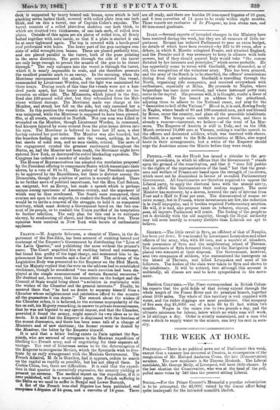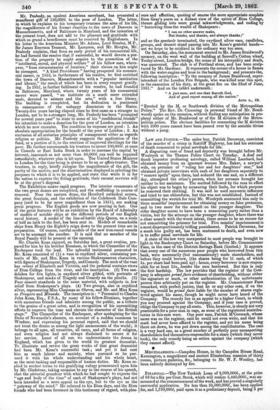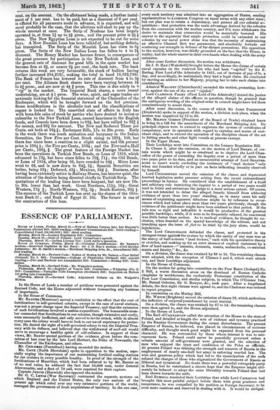THE WEEK AT HOME.
Powricat.--There is no political news out of Parliament this week, except that a vacancy has occurred at Preston, in cousequenoe of the resignation of Mr. Richard Assheton Cross, the late (Conservative) member. The new candidate is Sir Thomas liesketh. The Liberal candidate, Mr. George Melly, of Liverpool, will have little chance. In the last election the Conservative, who was at the head of the poll, polled more votes by 340 than the present sitting Liberal.
SOCIAL.—For the Prince Consort's Memorial a popular subscription is to be attempted, the 42,000.f. raised by the recent effort being quite inadequate for the intended monolith obelisk.
Mr. Peabody, an opulent American merchant, has presented a munificent gift of 150,000/. to the poor of London. The letter, in which he explains to his temporary trustees the aims of his life, the magnificence of his former charities to the town of Danvers in Massachussetts, and of Baltimore in Maryland, and the intention of the present trust, does not add to the pleasure and gratitude with which so grand a beneficence must be received by Englishmen. In his letter to the American Minister Mr. Adams, Lord Stanley, MT., Sir James Emerson Tennent, Mr. Lampson, and Mr. Morgan, Mr. Peabody explains, that from an early period of his commercial life, he had formed the resolve that if successful, he would devote a por- tion of the property he might acquire to the promotion of the "intellectal, moral, and physical welfare" of his fellow men, where- ever, "from circumstances of location," their claims on him might be strongest. "A kind Providence" having prospered his commer- cial career, in 1852, in furtherance of his resolve, he first enriched the town of Danvers, Massachussetts with a "popular institution and library," the result of which has been in every respect gratify- ing. In 1857, in further fulfilment of his resolve, he had founded in Baltimore, Maryland, where twenty years of his commercial career were passed, "an institute on a much more extended scale, devoted to science and the arts," with a free library. The building is completed, but its dedication is postponed in consequence of the unhappy dissension in the States. Twenty-five years having elapsed since he first came as a stranger to London, not to be a stranger long, Mr. Peabody has been "prompted for several years past" to state to some of his "confidential friends" his intention to make a donation for the poor of London, an intention which he now executes. The condition he imposes are good : 1. An absolute appropriation for the benefit of the poor of London ; 2. An exclusion of all sectarian principles of management either as regards religion or politics. Mr. Peabody suggests the application of the fund, or a portion of it, to the erection of improved dwellings for the poor. He further recommends his trustees to invest 100,000/. at once in Consols or East India Stock in order to increase the capital by interest, inasmuch as not more than 50,000/. can well be required iirrinediately, whatever plan is hit upon. The United States Minister in London for the time being is always to be an ex officio trustee. The trustees, in reply, briefly eulogize the magnificence of the gift, the purity of the motive, and the discrimination displayed in selecting the purposes to which it is to be applied, and state that while it is for the nation to express the fitting gratitude, their earnest services will be at the giver's disposal. The Exhibition makes rapid progress. The interior ornaments of the two great domes are completed, and the scaffolding in course of removal. Near the eastern dome, the Hereford cathedral screen, the great fountain, and the exhibition of the Colebrook Dale Com- pany (said to be far more magnificent than in 1851), are making great progress. The English goods are now pouring in fast. One of the great features will be an exhibition by the Board of Admiralty of models of notable ships at the different periods of our English naval history. A. model of the line-of-battle ship Queen, on a scale of half an inch to the foot, has been sent in. Models of remarkable ships from Henry the Eighth's reign down to the present time are in preparation. Of course, careful models of the new iron-cased vessels are to be amongst the number. It is said that no member of the Royal Family will be present at the opening.
Mr. Charles Kean enjoyed, on Saturday last, a great ovation, pre- pared for him by his brother Etonians, in which the Chancellor of the Exchequer took the lead. The splendid testimonial presented to Mr. Kean consisted of (1) a vase in oxydized silver, containing por- traits of Mr. and Mrs. Kean in various Shakespearean characters, with figures of Shakespear, Tragedy, and Comedy The neck of the vase has relievi of Elizabeth and Victoria, and the pedestal contains views of Eton College from the river, and the inscription. (2) Two can- delabra for five lights, in oxydized silver gilded, with portraits of Shakespear, and masks of Tragedy and Comedy on the plinths. (3) Four dessert standards in the same material, with subjects in low relief from Shakespear's plays. (4) Two groups, also in oxydised silver, representing Miss Chapman as Oberon, and Mr. and Miss Kean as Prospero and Miranda. The inscription is : "Presented to Charles John Kean, Esq., F.S.A., by many of his fellow-Etonians, together with numerous friends and admirers among the public, as a tribute to the genius of a great actor, and in recognition of his unremitting efforts to improve the tone and elevate the character of the British sta,en." The Chancellor of the Exchequer, after apologizing for the Duke of Newcastle's absence, on account of a sudden summons to Windsor, and expressing his personal regard, said that we should not treat the drama as among the light amusements of the world; it belongs to all ages, all countries, all races, and all forms of religion, and even religion had not always disdained to secure it for her service. Least of all can we underestimate the drama in England, which has given to the world its greatest dramatist. To illustrate and revive the great works of that great dramatist had been Mr. Kean's successful task ; and yet it had cost him as much labour and anxiety, when pursued as he pur- sued it with his whole understanding and his whole heart, as the most tasking and responsible of human duties. Mr. Kean re- plied in modest terms to the gratifying eulogy pronounced upon him by Mr. Gladstone, taking occasion to say in the course of his speech, that the pictorial grandeur with which he had sought to express the "age and body of the time" of each of Shakspeare's plays, had not been intended as a mere appeal to the eye, but to the eye as the "gateway of the mind." He referred to his Eton days, and the Eton friends who had been foremost in this testimony of regard, with plea-
sure and affection, quoting of course the more appropriate couplets from Gray's poem on a distant view of the spires of Eton College, thence gliding into more genial acknowledgments, and ending by "borrowing from the wealth of Shakspeare
"I can no other answer make,
But thanks, and thanks, and always thanks ;" and so the spectacle terminated, the oxydized silver vase, candlebra, groups, and dessert stand passing into Mr. Kean's grateful hands— not we hope to be oxidized in the ordinary way too soon. On Saturday, also, the monument erected to Mr. James Braidwood's memory, on the west wall of the building at Scovell's Cotton wharf, Tooley-street, London-bridge, the scene of his intrepidity and death, was uncovered. The slab is of Portland stone, and has been sculp- tured by Mr. Gardiner. It represents the corner of a house in flames with the water-engine and hose in the background; and presents the, following inscription : "To the memory of James Braidwood, super- intendent of the London Fire Brigade, who was killed near this spot, in the execution of his duty, at the great fire on the 22nd of June, 1861." And on the tablet underneath : "A just man, and one that feareth God, And of good report among all the nation."
Acts x., 22.
"Erected by the M, or Southwark division of the Metropolitan Police." The Rev. Dr. Cumming (a personal friend of Mr. Braid- wood) spoke on the occasion, without finding any anticipation in pro- phecy either. of Mr. Braidwood or of the M division of the Metro- politan police. The obvious facilities for connecting the M division with 1000 years cannot have been passed over by the amiable divine without a pang.
LAW AND JUSTICE.—The sailor boy., Patrick Devereux, convicted of the murder of a crimp in Ratcliff Highway, has had his sentence of death commuted to penal servitude for life.
A disgusting case of fraud and depravity was brought before Mr. Woolrych at the Thames Police Court on Tuesday. A deaf and dumb impostor professing astrology, called William Lambard, had obtained money from an ignorant woman Mrs. Baker, a sawyer's wife, on pretence of "ruling her and her daughters' star," had obtained private interviews with each of her daughters separately to "remove spells" upon them, had seduced the one and, on a different day, attempted the other's person, when her screams brought her mother to her assistance. The method followed by the man to effect his object was to begin by measuring their limbs, for which purpose he removed their clothing. It was said he used mesmeric influence and tried to use chloroform, but this was not established. Instead of committing the wretch for trial Mr. Woolrych sentenced him only to three monnths' imprisonment for obtaining money on false pretences, and to two more for the assault on the younger daughter. The elder daughter seems to have been a consenting party rather than a victim, but for the attempt on the younger daughter, where there was a clear assault with the worst intent, there seems to be no excuse for not committing the prisoner for trial. Five months' imprisonment is a most disproportionately trifling punishment. Patrick Devereux, for a much less guilty act, has been sentenced to death, and even now is to suffer penal servitude for life.
A state of the law very unexpected to most people was brought to light in the Bankruptcy Court on Saturday, before Mr. Commissioner Fane, in the case of the District Savings Bank (limited.) It appears that every one of the numerous poor people who borrowed from this bank, were necessarily (but unconsciously) made shareholders, and before they could borrow, (the shares being for 1/. each, of which 5s. per share had been paid up) ; hence, every borrower is now respon- sible for at least 15s., besides the sum borrowed. But this is only the first hardship. The law provides that the register of the Com- pany is adequate primd facie evidence of shareholding, without either the signature or mark, or other authentication of the unfortunate person thus arbitrarily put on the register. Mr. Commissioner Pane remarked, with perfect justice, that he or any other man, if on the register, would be primeifacie liable for the number of shares regis- tered against his name, though he might never have heard of the Company. The remedy lies in an appeal to a higher Court, in which you may proceed against the Company, and if your case is proved, oblige the Company to pay all costs. This, however, is clearly not very practicable for a poor man in rags, as some of the registered contnba- tones in this case were. One poor man, Patrick M'Cormack, whose name was on the register, said he could not even write, and that his mark had never been affixed to the register, and yet his name being there set down, he was put down among the contributories. The case is a very hard one, as a great number of perfectly poor unsuspecting shareholders find themselves responsible for a share (which they never took), the only remedy being an action against the company (which they cannot afford).
•
MISCELLANEOIIS.—Campden House, in the Campden House Road, Kensington, a magnificent and ancient Elizabethan mansion of thirty rooms, picture galleries, &c., belonging to Mr. W. F. Woolley, has been entirely destroyed by fire.
FINANCIAL—The New Turkish Loan of 8,000,000/., at the price of 68 for a Six per Cent. Stock, which will realize 5,410,0001., was an- nounced at the commencement of the week, and has proved a singularly successful application. No less than 35,000,0001., has been applied for, and 1,750,000/, paid upon it as a preliminary deposit, being 5 per cent. on the amount. On the allotment being made, a further instal- ment of 5 per cent, has to be paid, but as a discount of 6 per cent. is offered for all payments made in advance, it is expected, and will most probably be the case, that the allottees will elect to pay up the whole amount at once. The Scrip of Nushoar has been largely operated in, at from 14 up to 24 prem., and the present price is 24 prem. The New Egyptian Loan is not expected to be out for some days. A New Russian Loan has been talked of, but nothing definite has transpired. The Scrip of the Moorish Loan has risen to 64 prem. The Scrip of the New Italian Loan has fallen to 4 to 34 discount. The Money Market has become firmer, in consequence of the great pressure for participation in the New Turkish Loan, and the general rate of discount for good bills in the open market has become firm at 24, or nearer 21 per cent., the bank rate. The bank returns this week are very favourable, the stock of bullion having further increased 284,2121., making the total in hand 16,832,798/. The Bank of France has lowered its rate of discount from 4 to 3f per cent. The Alliance Bank shares have been varying between 3f to 4/ prem., and are now at 444 prem. This rise is due solely to a "rig" in the market. The Imperial Bank shares, a more recent undertaking, are at 41 prem. The wine, spirit, and sugar trades are anxiously looking for the financial statement of the Chancellor of the Exchequer, which will be brought forward on the 3rd proximo. Some modifications in the alcoholic test and the classifications of sugars is looked for. The unsettled state of affairs in Italy has with bona-fide sales of stock by parties who have desired to invest or subscribe to the New Turkish Loan, caused heaviness in the English funds, and Censols have been down to 934, but have rallied to 93t for money, and 934 for account. The New and Reduced Three per Cents. are both at 9244; Exchequer Bills, 17s. to 20s. prem. Early in the week there was much animation and buoyancy in the Indian Securities, the New Five per Cent. Stock rising to 1084, 109, but there has since been a reaction to a slight extent, and thb present price is 10844; the Five per Cents., 1034; and the Five-and-a.Half per Cents., 1084, 4. The great feature of the Foreign Market has been the operations in Turkish New Bonds, or Loan of 1858, which advanced to 734, but have since fallen to 701, 714; the Old Bonds, or Loan of 1854, after being 86, have receded to 844; Mires Loan went to 66, and is now down to 641, 54; Spanish Securities are better, being 534; Deferred, 434; Mexican, 344 4. Business, after having been extremely active in Railway Shares, has become quiet, the attention of the dealers being directed chiefly to Turkish Scrip. The quotations of the leading lines have been buoyant, but are now 10s. to 20s. lower than last week. Great Northern, 1154, 164; Great Western, 734 ; North-Western, 924, 34; South-Eastern, 934 I. The success of the Turkish Loan has sent up the shares of the Otto- man Bank 2/.; and Bank of Egypt 21. 10s. The former is one of the contractors of this loan.
































 Previous page
Previous page